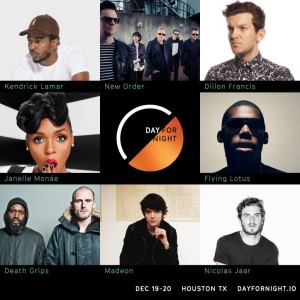Enjoy the Silence — Philip Glass’s Sound Engineer On Why You Should Arrive Early to Day For Night

Photo by Ryan Kelly
Dan Bora is my friend. He is also Philip Glass’s sound engineer. Oh heck, here’s his whole bio:
Dan received a B.A. with honours, in Musicology and Romance Languages & Literature from The University of Chicago in 1999. As producer, engineer, and sound designer of albums, film scores, and live sound, Dan has worked with Marina Abramovic, Antony, Philip Glass, Howard Shore, Nico Mühly, Sufjan Stevens, and groups such as Kronos Quartet, The Magnetic Fields, Matmos, and the Philip Glass Ensemble. His credits include Academy Award winning Fog of War, the Academy Award nominated The Illusionist, Notes on a Scandal, The Reader, Woody Allen’s Cassandra’s Dream, as well as the revival of Robert Wilson’s Einstein on the Beach, and the Life and Death of Marina Abramovic.Dan’s live mixing and sound design have been praised as “deft,” “provocative and even poignant…” (New York Times).
I asked Dan a bunch of goofy questions, mostly to give him a chance to explain why the Philip Glass Ensemble is playing so early in the day at Day For Night. I called him “the Fifth Beatle” in the PGE and compared the Philip Glass Ensemble’s early Saturday time slot to the time that Miles Davis opened for the Grateful Dead. Dan didn’t really answer my questions (below). Instead, he wrote something much better, which I present to you verbatim.
Now be sure to arrive early on Saturday to catch the most important composer of the century playing in an exhibition of the most cutting edge visual art alongside a bevy of legends and legends-in-the-making.
No disrespect to any of the bands playing at Day For Night, but in all honesty, I did have something of a “This is like when Miles Davis opened for the Grateful Dead!” reaction when I learned that they would be playing at 1:30 in the afternoon. Of course, it has to be this way simply because the Ensemble’s equipment can’t be tampered with between the sound check and the performance. Could you describe the unique challenges you face as sound engineer for a group that plays acoustic instruments — many of which are operating in a similar sonic range — without sounding muddy or flat, not to mention the way they make use of silence? In other words, how is doing sound for the Philip Glass Ensemble different from doing sound for, say, a DJ or a rock band?
Your ears are perhaps your most important asset, at least in the context of your career, yet as a music fan, you must often want to crank it to 11. How do you balance these opposing needs? Have you ever left a concert because it was too loud?
Is it true that you can hear a dog whistle? (What did she sound like?)

It’s not all about silence though — that’s just one end of the spectrum, and sort of where I come in with live mixing. I’ve played this mind game where I think of mixing like a game of Pong, a binary process where you can only make the palette go up or you can make it go down: All I’m really doing is making things quieter or louder (whether it’s a frequency, that saxophone, or the whole band). In reality I’m doing more than that, but it has been entertaining to think that way, and to see how elastic I can make Philip’s music and the Ensemble’s performance in the concert space- how loud, how soft can I get before the music starts to disintegrate?
Loudness is on the other end of the spectrum. Being able to mix, or listen, loud things is just as fun as being able to work on quiet things. One of my favourite things I get to do each year is whip up Highway 1 from Big Sur late at night, with the Pacific Ocean crashing into America on my left and Die Antwoord pumped up all the way (and trying to swear along in Afrikaans). But enjoyment is not always about cranking it up to ‘11.’ If I go to a show, I won’t leave because it’s too loud for my ears — I just bring protection. You never know where you get a new idea — the time I’ve spent at Berghain, one of my other favourite places in the world, listening to the world’s best deejay’s opened my mind to the affinities between Philip’s early works and electronic dance music, and changed the way I think about mixing.
I’m glad the Philip Glass Ensemble is getting to play at the Day for Night Festival and I hope we all find some form of clarity — be it silence, a bicyclette (white wine and Campari), or smile, which opens us up to mixing, hearing, or playing the music we love along with music we haven’t heard before to have a memorable weekend.










